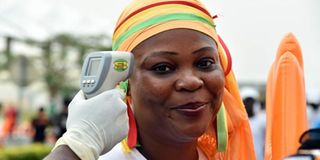Tough measures in place over Ebola fears

The temperature of a football supporter at the entrance of Malabo Stadium on Tuesday is taken by a health worker as part of protective measures against Ebola. PHOTO | ISSOUF SANOGO |
What you need to know:
- All visitors to country enter via Malabo and are screened on arrival.
- Laser thermometer, popularly referred to as the ‘gun’, has been a constant feature at the event as everybody at all venues goes through its reading.
BATA
A section of home supporters burst into a seemingly rehearsed chorus with lyrics of “We don’t fear anyone, we only fear Ebola”, moments after midfielder Javier Balboa had scored the opening goal during the team’s 2-0 win over Gabon in their final group match last Sunday.
This chorus, obviously meant to intimidate the opposing team also went some length in showing the appreciation of the Ebola pandemic is in this part of the world.
The disease first broke out in Liberia last year and has so far claimed 8,600 deaths out of the 22000 cases reported, according to Grev Hunt, who is the Communications for Development Sub Regional Ebola Coordinator attached to UNICEF.
OUTBREAK OF DISEASE
The outbreak of the disease led to the withdrawal of Morocco as the hosts of the tournament. They were consequently banned from football activities.
This development opened an opportunity for Equatorial Guinea to came into the picture.
It is still unclear whether it is the government of this oil-rich central African nation that approached the Confederation of African Football with a request to host this competition or vice versa.
But Equatorial Guinea was eventually awarded the hosting rights of this competition dubbed the “African World Cup” for the second time in three cycles, and with this came the challenge for the hosting the thousands of visitors coming for the event.
“Immediately Morocco rejected the games and Equatorial Guinea’s proposal was accepted, the hosting government contacted the World Health Organization and UNICEF, to share experience, practises and lessons learnt, to ensure that the country remained Ebola Free,” Hunt told Saturday Nation Sport.
“So we are here to help in a preparedness plan, prevention and response.
‘SOCIAL MOBILISATION’
“Our focus is mainly on social mobilisation, we have with the help from Government, been preparing all those adverts on the mainstream media and bill boards, alongside the pamphlets to sensitize the population because ignorance and lack of understanding causes panic and stigma,” Hunt, who holds a Masters in International Health from John Hopkins University in the USA, added.
One of the decisions Hunt and his team advised the government of Equatorial Guinea was to ensure everybody visiting the country was screened.
“This country has three major airports in Malabo, Bata and Mongomo, but a decision was made from above to ensure anybody visiting the country only checks in through Malabo,” Hunt said.
Here, three types of checks have been conducted. First is the Infared camera, that, depending on whether the person is black or white, checks for abnormally high temperature.
And then there is the Laser thermometer cheekily referred to by most people here as the “gun” which is pointed at the temple or forehead and meant to confirm a person’s temperature.
“Anybody with abnormal temperature is pulled aside for further scrutiny and observation.
“This is because abrupt high temperature is the biggest indicator that one might have been infected, and this can be noted during 8-10 days of the 21 day incubation period,” the medical scholar confirmed.
He added with a smile: “You can imagine so far we have zero cases.”
Besides, the government and the health group have also set up three emergency centres in Malabo, Bata and another based between Mongomo and Ebebiyin, as a measure in case of a possible outbreak, where the decision to quarantine any patient can be made.
Each of the 16 teams participating in the competition has also been assigned a doctor, who provides a medical report on a daily basis.
SUSPECTED PATIENT
While the visiting health teams have also held several courses to train the trainers.
Even the hotel managers have been trained on how to handle a suspected patient, considering direct contact with fluids such as sweat, diarrhoea and vomit almost certainly causes infection.
The latest Ebola outbreak was, according to Hunt, “almost certainly” caused by a two-year-old who was playing under a tree in Guinea, who came into contact and probably consumed waste from bats that were residing around there.
Amongst the biggest casualties was a traditional healer in Guinea, who reportedly infected more than 300 people.
Liberia, Sierra Leone and Nigeria are some of the other countries which have registered Ebola cases.
With the measures taken by the government of Equatorial Guinea and the reported success so far, maybe just maybe the home supporters need “not fear Ebola” and the tournament will conclude Ebola free.





